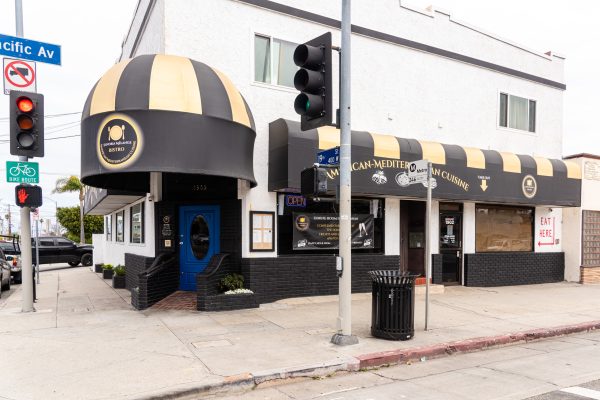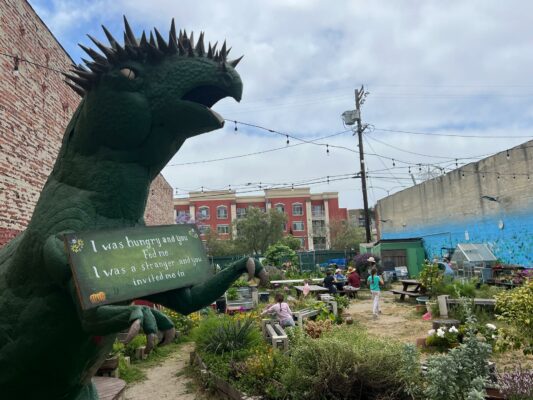
Imagine this awkward situation: you leave the highest-paying job you’ve ever had in order to work with a colleague whose talents you revere – and then as soon as you get there, he leaves and the business is sold to someone else. Very quickly the inexperienced new owner decides he doesn’t really want to own the restaurant he just bought, and he decides to sell it again. What do you do?
If you are Luis Alvarez, you buy the business yourself and make it work. That’s exactly what he did at Misto Caffe, the popular Torrance restaurant he has owned for the last seventeen years.
Luis’s story is all the more remarkable because of how his career started – as a teenage immigrant who spoke almost no English and was alone in this country.
“I came here when I was fourteen years old from Chapala, near Guadalajara,” he explained. “I moved straight from Mexico to Redondo Beach, and I came here by myself. It was for the adventure. I had no formal education, and I started as a fry cook at a Pioneer Chicken outlet. From there I moved to a restaurant in Manhattan Beach called the Down Under Aussie Bistro, and that’s where I learned most of my cooking skills. I learned their recipes before I learned much about American food.”
The items served at the Down Under Bistro were certainly not like anything in the culinary mainstream – they offered strange and sometimes silly items like bacon wrapped dates stuffed with vegemite, the salty, yeasty Australian condiment. I had to ask if there was anything that Luis learned in that kitchen that he still does.
“Hard work,” he replied instantly and laughed. He turned serious and added, “I still remember some of those ideas, and I may have used some in my food here. I experiment sometimes with specials, and if people like it, I leave it on the menu. My kids are my critics – I try my recipes on them first…”
Luis must have learned something in that kitchen, because he rose quickly in the industry. He was head cook at Charlie Brown’s, then sous-chef, while simultaneously picking up Japanese techniques at his other job at Torrance’s Seafood Show. The Japanese techniques served him well as head chef at Paradise Restaurant, which took a groundbreaking Asian-Latin fusion cuisine to a Gardena office building. This was a high-visibility job, and Alvarez met many of the elite chefs of the area at charity benefits and other public forums. The most fateful meeting was with Michael Shafer of The Depot in 1978, when that chef was a partner with Michael Franks and Robert Bell of Chez Melange in several restaurants.
As Luis remembers it, “I met Michael Shafer at cooking events, and I said I’d like to work for him someday. He called me two weeks later and asked if I still wanted to work for him. I said yes, and he brought me into Misto. I didn’t know that someone else was planning to buy the place. I worked for the new owner very briefly, but he decided he didn’t really want to be in the restaurant business, and I ended up buying the place myself. He was very kind and helped me – I knew how to cook, but I had no idea about the process of buying a business. I had to learn… I also had help from my former bosses at Paradise, Vince Kikugawa and Glenn Okamoto. From them I learned about numbers – food costs, labor costs, most of what was needed to run a restaurant. It was an education, and I learned while I was on the job using the information.”
At that time, Misto had just been through an identity crisis. Franks, Bell, and Shafer had taken the restaurant that had been serving a lot of French and Italian dishes and tried to introduce more challenging contemporary items. Alvarez remembers that the regulars did not welcome the change.
“It didn’t work, so they changed it back, made the food simpler – we have a very loyal clientele who like what they like. About half the items on my current menu were being served when I bought the place. Our regulars will come in and eat the same items for years, and their kids who were babies when they first came here come in and order their favorites too. If we don’t see some people for a week, we get worried. We’re their coffee shop, the place that real people come. It’s not that they have the same thing every time – on the average, about 50% of the business every night is our specials. I try different things, and they trust me so they experiment with me.”
When asked who his typical customer was, Luis had a ready answer. “This is a family restaurant, though the crowd changes depending on the time of day. Midday during the week most of our clients are women from the local offices, people who drive up from Torrance to have lunch, and in the evening it’s families and an older crowd. It’s diverse, different at different times.”
The pressure of the early days when he was learning on the job has gone, and Luis Alvarez faces a task that is a problem for every chef: balancing his work and his family and social life.
“If I let it my job would be 24/7, but I make time for my family. I go to my kids’ basketball events one hour, I have a catering job the next hour, meet with my employees and work in the kitchen. I do try to take Sundays off; I play soccer and get involved with my kids’ school. They are 17, 14, and 7, and they all want to work in the restaurant business. My oldest son already is – he likes the good food, the paycheck and the tips. I feel like he has a greater respect for me, since he has seen what I do. Working together has given him a better connection to me, and he is helping me in other ways. He has a connection to technology, and he has ideas about marketing and media. It’s good for both of us.”
Besides his family, Alvarez has two hobbies: sports and music.
“I play soccer every Sunday, and I like to sing – I am very passionate about music. I don’t think I’m quite good enough at either of those to make a living at it, but they bring me a lot of pleasure. I sing Mexican Ranchero and Mariachi songs at nightclubs, parties… I have surprised some of my clients when I sing at events. I am passionate about life, and the sports and music are part of that. “
The music is a link to Luis’s Mexican heritage, and it brought up the question of his relationship to his family back in Mexico. His comment was both revealing and universal, a common complaint from the youngest sibling.
“They know I am successful and making money, but I’m still the baby, they still wonder if I know what I’m doing. My family is in the restaurant business in Mexico, and I have been teaching them some of the things I have learned about the pricing, the economics. It has helped them respect me, but to your family, you never entirely grow up.”









